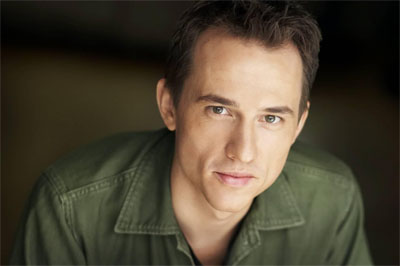The Biz Interview: Daniel Arnold of Lawrence & Holloman
Daniel Arnold is one of the stars and co-writers of the screen adaptation of Lawrence & Holloman. In advance of its Vancouver premiere on July 18th, Daniel spoke to us about the journey to bring the film to life and his own career.
Can you discuss the creative process of your involvement in Lawrence & Holloman from the earliest days all the way to release?
Yeah, I grew up as an actor and writer in theatre and so I’d seen three productions of the stage play Lawrence & Holloman (written by the amazing Morris Panych, winner of 2 Governor General’s Awards for Drama). So when Matt asked if I wanted to do the play, I looked at it again, and went: Wait, this would make an awesome indie feature. Like the cult hit Withnail & I or Labute’s Sundance hit In the Company of Men. So we brought producer Paul Armstrong aboard, who had seen and loved the play at the Arts Club in 1999, and we got development funding from Corus Entertainment and then the Harold Greenberg Fund and BC Film (now Creative BC). After 3 years of adapting it into a screenplay, we then attached Exec Producers Mary Anne Waterhouse and Andrew Currie, then Telefilm came aboard with production financing, then we raised the rest of the money, got Super Channel involved, and made the thing. It sounds easy, but that’s only the Coles Notes. It was a humungous learning curve on me and Matt’s part. We had made a 35mm short together (The Janitors) through the NSI Drama Prize and he had made a few other shorts, but writing this feature, securing the money, and making the movie was a mind-bogglingly complex thing — and if you strive towards it being the best it can possibly be, it’s all-consuming. Oh, I co-wrote, am on the producing team, and play Holloman.

From your experience in co-writing the film, what are the most important elements that a feature film screenplay needs to be successful?
I guess I found that it needs to be able to excite the people with money or who are going to make it. That’s what it comes down to. Sometimes people wouldn’t jive with the script and you have to just say “Okay, they’re not going to help us make it.” It doesn’t mean it’s bad (necessarily), it just means the fit isn’t right. So what are the elements that attract that interest? Again, it depends who you’re talking to and pitching to. I’ve heard some producers say they want something that will sell in foreign markets, which usually means a genre picture with a bankable name actor. Story is less important. Other people, the ones we were dealing with, mostly look for that fresh idea, a different spin on a universal theme, a story that compels. But again, the alchemy is so important … really it’s all about finding partners who grab hold of what you’re writing, and how you’re writing it. So you’re always writing with an audience in mind, and then trying to find that audience. That’s what I do. When I’m structuring a story, I’m always thinking two things: Where is the character at in their journey/what would they do next? And 2: What is the reader/audience feeling now? What emotions am I invoking, where to do I take the audience next, and why should they care? Writing a story is a very manipulative exercise. I picture it like sitting around a campfire telling a story to sleepy people: it’s got to have twists and turns and take them on a visceral, emotional, and intellectual ride, and keep them awake! And hopefully, if it’s really good, also ignite in their dreams.
What was your most memorable moment from the making of Lawrence & Holloman?
Actually the moment that sticks out the most is being on the phone one-on-one with Karynn Austin, who at the time was the regional director at Telefilm Canada, and hearing her tell me how much she enjoyed the script. No major notes, just “I loved it.” I still remember where I was, what time of year it was, and the inflection of her voice. That moment was the culmination of me, Matt, and Paul’s 2-3 years of work thus far, and is what spurred the eventual greenlight towards production. In my mind it was probably the most important moment in the film’s history; without it, it may not be in front of you today nor getting all the awards and accolades. Thank you, Karynn.

You’ve worked in both film and television projects. How are they different as an actor and how does your preparation change?
This is an interesting question because I’ve been in TV but never made TV. But I made Lawrence & Holloman. So when I work in TV it’s very different than this. TV gigs for me have usually been like being a small cog in a big machine; you show up, do your acting, commit to the moment, and then go home and collect the cheque. Whereas for L&H it was all-consuming. That said, I’ve been in other films where I wasn’t making the thing, so they’ve been a lot more like a TV set too. Everyone knows their job, and the actor’s job is to act in the part. When it comes to doing that, both TV and film are the same to me. And even though every project is different, the preparation is pretty much the same: learn the lines by learning the moment to moment beats, while also making choices about character, intention, motivation, and stakes.
What books have been influential to your creative journey as a writer and actor?
Awesome, love to answer this one. Cuz I read books like this all the time! As an actor, the most thumbed-through ones on my shelf are True and False by David Mamet, Michael Shurtleff’s Audition, Larry Moss’ The Intent to Live, and A Practical Handbook for the Actor. As a writer, Robert McKee’s Story, Blake Snyder’s Save the Cat series, The Eight Characters of Comedy, and Syd Field’s The Screenwriter’s Problem Solver. Oh, I also loved the book The Activist Screenwriter and I keep a copy of One Less Bitter Actor on hand!
What advice would you give to aspiring actors and screenwriters?
Read the books above! Actors, if you want to act, act. Whether it’s classes or making your own stuff, just do it. Learn. I started getting paid to do theatre when I was 12, but I still went through a conservatory acting program, and that helped solidify a career for myself in the theatre. Screenwriters, I hear a lot of people say to develop a database of story ideas, and sure that’s important, I have that … but in my experience nothing beats sitting down and wrestling those one or two projects into the best they can possibly be in order to get them made. Writing is rewriting, I’m a firm believer in that — and you must listen to your audience. Oh, and if you want get paid to act or write, you have to treat them like crafts, but also businesses.
What is the biggest challenge you’ve faced in your career and what have you done to overcome it?
Biggest challenge has been and continues to be transitioning from a theatre-only actor to an actor who works on screen as well. What am I doing to overcome that? Making my own movies! I should probably do more to overcome it, but this is a start.
What would you like to share about your upcoming projects?
Well beyond the theatrical release of Lawrence & Holloman — which is already amazing — and the fact that it’s won 11 awards in 11 festivals, received “must-see” reviews, 9 Leo nominations, and is currently nominated for 4 Canadian Comedy Awards (all right all right all right) — I’m also thrilled that my other feature script Any Night just won the nation-wide CFF Super Channel Screenplay Award, which means it’s on Canada’s It-List of the best as-of-yet-unproduced screenplays and receives a pre-buy offer from Super Channel, worth $30K-$50K or more depending on budget. So hopefully that one will get made soon!
For more information about Lawrence & Holloman, please visit LawrenceandHolloman.com.

















